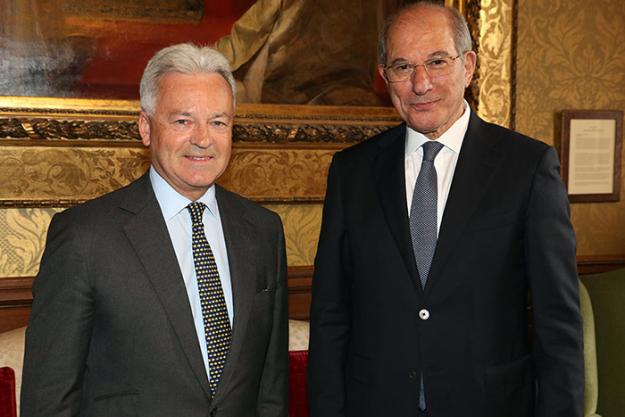
The OPCW Director-General, Ambassador Ahmet Üzümcü, with Minister of State for Europe and the Americas at the Foreign & Commonwealth Office, The Rt Hon Sir Alan Duncan
THE HAGUE, Netherlands — 25 May 2018 — The Director-General of the Organisation for the Prohibition of Chemical Weapons (OPCW), Ambassador Ahmet Üzümcü, met with senior government officials and highlighted the chief challenges in chemical demilitarisation during his visit to the United Kingdom from 23 to 25 May 2018.
Ambassador Üzümcü held separate meetings on 24 May with the UK’s Minister of State for Defence, the Rt Hon Earl Howe, and Minister of State for the Foreign and Commonwealth Office, the Rt Hon Sir Alan Duncan.
During these meetings, the Director-General thanked the UK for its consistent stance as a champion of the OPCW’s work and as a vocal defender of the global norm against chemical weapons.
In his address to the 21st International Chemical Weapons Demilitarisation Conference on 24 May, the Director-General depicted the shifting landscape of chemical demilitarisation.
The Director-General stated that there is “a clear and continuing role” for the OPCW in combatting chemical terrorism – a major new threat. He predicted that: “Diligent implementation of the legal obligations coupled with effective responses measures offer the best protection in this regard.”
At the Royal Society of Chemistry on 23 May, the Director-General spoke about the importance of science related to the implementation of the CWC.
He remarked that as the Organisation goes forward into the post-destruction era, the relationship with science will intensify and the OPCW will continue relying upon scientific insights to ensure that science is used solely for human benefit.
Ambassador Üzümcü joined a panel of prominent experts to discuss stopping the use of chemical weapons in modern conflicts, during an event at Chatham House on 25 May.
Background
Organised by the Defence Science and Technology Laboratory – part of the UK Ministry of Defence – the International Chemical Weapons Demilitarisation Conference brings together an international and diverse group of specialists from the military, scientific and chemical industry fields to discuss efforts to eliminate chemical weapons.
Royal Society of Chemistry’s (RSC) mission is to advance excellence in chemical sciences. After over 175 years of its existence, RSC boasts over 54,000 members across the world, who contribute to educating future generations of scientists, providing advice to governments on policy, and creating partnerships with industry and academia.
Chatham House is a leading independent policy institute that provides analysis and debating platform about critical global, regional and country-specific challenges and opportunities. International security counts among Chatham House’s key research themes.
As the implementing body for the Chemical Weapons Convention, the OPCW oversees the global endeavour to permanently and verifiably eliminate chemical weapons. Since the Convention’s entry into force in 1997 – and with its 192 States Parties – it is the most successful disarmament treaty eliminating an entire class of weapons of mass destruction.
Over 96% of all chemical weapon stockpiles declared by possessor States have been destroyed under OPCW verification. For its extensive efforts in eliminating chemical weapons, the OPCW received the 2013 Nobel Peace Prize.
More Information
- Keynote speech by the Director-General of the OPCW Ambassador Ahmet Üzümcü Royal Society of Chemistry London, United Kingdom 23 May 2018
- Keynote speech at 21st International CWD Conference by the Director-General of the OPCW Ambassador Ahmet Üzümcü London, United Kingdom 24 May 2018
- Remarks by the Director-General of the OPCW Ambassador Ahmet Üzümcü Chatham House, United Kingdom 25 May 2018
- Royal Society of Chemistry
- Chatham House
- OPCW Fact Sheets
